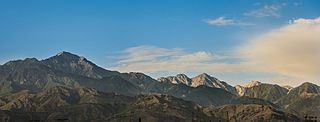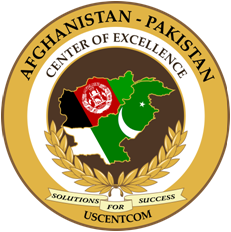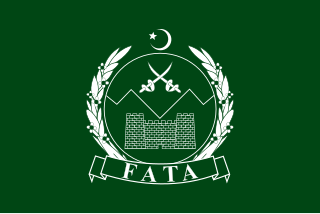Related Research Articles

The Durand Line, also known as the Afghanistan–Pakistan border, is a 2,611-kilometre (1,622 mi) international border between Afghanistan and Pakistan in South Asia. The western end runs to the border with Iran and the eastern end to the border with China.

The Spīn Ghar or Safēd Kōh meaning both White Mountains, or sometimes meaning white mountain range, is a mountain range to the south of the Hindu Kush. It ranges from eastern Afghanistan into Khyber Pakhtunkhwa, Pakistan, and forms a natural border between the two areas. Its highest peak is Mount Sikaram on the Afghanistan–Pakistan border, which towers above all surrounding hills to 4,755 m (15,600 ft) above mean sea level. The lower hills are mostly barren and treeless, but pine grows on the main mountains that form the East Afghan montane conifer forests.
Pashtun diaspora comprises all ethnic Pashtuns. There are millions of Pashtuns who are living outside of their traditional homeland of Pashtunistan, a historic region that is today situated over parts of Afghanistan and Pakistan. While the (erstwhile) Pashtunistan is home to the majority of Pashtun people, there are significant local Pashtun diaspora communities scattered across the neighbouring Pakistani provinces of Sindh and Punjab, particularly in their respective provincial capital cities of Karachi and Lahore. Additionally, people with Pashtun ancestry are also found across India; particularly in Rohilkhand, a region in the Indian state of Uttar Pradesh; and in the Indian states of Gujarat and Rajasthan. Outside of South Asia, significant Pashtun diaspora communities are found in the Arab states of the Persian Gulf, the United States, the United Kingdom, Germany, Iran, Australia, Canada, and Russia.

The Frontier Corps, are a group of paramilitary forces of Pakistan, operating in the provinces of Balochistan and Khyber Pakhtunkhwa, to maintain law and order while overseeing the country's borders with Afghanistan and Iran. There are four Frontier Corps: FC KPK (North) and FC KPK (South) stationed in Khyber Pakhtunkhwa province, and FC Balochistan (North) and FC Balochistan (South) stationed in Balochistan province.

The insurgency in Khyber Pakhtunkhwa, also known as the War in North-West Pakistan or Pakistan's war on terror, is an ongoing armed conflict involving Pakistan and Islamist militant groups such as the Tehrik-i-Taliban Pakistan (TTP), Jundallah, Lashkar-e-Islam (LeI), TNSM, al-Qaeda, and their Central Asian allies such as the ISIL–Khorasan (ISIL), Islamic Movement of Uzbekistan, East Turkistan Movement, Emirate of Caucasus, and elements of organized crime. Formerly a war, it is now a low-level insurgency as of 2017.

Lieutenant-General Ali Muhammad Jan Orakzai, is a retired three-star rank general officer in the Pakistan Army who served as the Corps Commander of XI Corps and the principle commander of the Western Command. As Commander, he commanded all military combat assets and oversaw the peaceful deployment of XI Corps in the Northern Areas and the Federally Administered Tribal Areas (FATA).

The Kunduz airlift, also called the Airlift of Evil, refers to the evacuation by Pakistan of hundreds of top commanders and members of the Taliban and al-Qaeda as well as their Pakistani advisors from the city of Kunduz, Afghanistan, in November 2001. The incident reportedly occurred just before the Siege of Kunduz, which saw the city fall into the hands of the Northern Alliance and the United States during the opening phase of the War in Afghanistan. From Kunduz, the militants were taken to Chitral in Khyber Pakhtunkhwa and Gilgit in the Northern Areas. However, both the United States and Pakistan have denied that the airlift ever took place; Richard Myers, the then-chairman of the Joint Chiefs of Staff, said that the Kunduz Airport had been disabled by American bombing raids; Donald Rumsfeld, the then-Secretary of Defense, stated on 2 December 2001 that "neither Pakistan nor any other country flew any planes into Afghanistan to evacuate anybody".

Lashkar-e-Islam, also written as Laskhar-i-Islam, is a Deobandi jihadist terrorist group operating in Khyber District, Khyber-Pakhtunkhwa Province, Pakistan and the neighboring Nangarhar Province, Afghanistan.

The Pakistani Taliban, formally called the Tehreek-e-Taliban-e-Pakistan, is an umbrella organization of various Islamist armed militant groups operating along the Afghan–Pakistani border. Formed in 2007 by Baitullah Mehsud, its current leader is Noor Wali Mehsud, who has publicly pledged allegiance to the Afghan Taliban. The Pakistani Taliban share a common ideology with the Afghan Taliban and have assisted them in the 2001–2021 war, but the two groups have separate operation and command structures.

The Khyber Pass is a mountain pass in the Khyber Pakhtunkhwa province of Pakistan, on the border with the Nangarhar Province of Afghanistan. It connects the town of Landi Kotal to the Valley of Peshawar at Jamrud by traversing part of the White Mountains. Since it was part of the ancient Silk Road, it has been a vital trade route between Central Asia and the Indian subcontinent and a strategic military choke point for various states that controlled it. The Khyber Pass is considered one of the most famous mountain passes in the world.
Pakistanis in Afghanistan are mostly refugees, but also include laborers, traders, businesspersons, and small number of diplomats. Those working in white-collar professions include doctors, engineers, teachers and journalists. Because Pakistan and Afghanistan are neighbouring states with a loosely controlled border, and a distributed population of ethnic Pashtuns and Baloch people, there is constant flow of population between the two countries.

The Afghanistan-Pakistan Center of Excellence is an internal think tank at the United States Central Command focused on Afghanistan, Pakistan, and the Central Asian States. The AFG-PAK COE seeks to build expertise in and provide improved intelligence for the missions in those countries and the states around them. The AFG-PAK COE is planning to help expand the number of U.S. military and civilian experts on Afghanistan and Pakistan by providing them with education and training opportunities covering the culture, language, and region, and keeping these analysts and military forces connected to these missions in those countries when they are between deployments.

The Federally Administered Tribal Areas, commonly known as FATA, was a semi-autonomous tribal region in north-western Pakistan that existed from 1947 until being merged with the neighbouring province of Khyber Pakhtunkhwa in 2018 through the Twenty-fifth amendment to the constitution of Pakistan. It consisted of seven tribal agencies (districts) and six frontier regions, and were directly governed by the federal government through a special set of laws called the Frontier Crimes Regulations.

Logistics operations by NATO forces during the War in Afghanistan (2001–2021) took place under the auspices of the International Security Assistance Force from 2001 to 2014, then under the Resolute Support Mission from 2015 until 2021.
The Bajaur Scouts is a paramilitary regiment of the Frontier Corps Khyber Pakhtunkhwa (North) of Pakistan, recruited locally in Bajaur District and officered by regular Pakistan Army officers. The Scouts were previously the Bajaur Levies, and served in the Bajaur, Swat, and Dir tribal areas. The force was formed in April 1961 from several units of the Khyber Rifles and Chitral Scouts. In the early 21st century, the Scouts have been involved in anti-drugs operations. In 2011-2012, the unit received a number of drug testing kits to assist in their work against drug smuggling.

North Atlantic Treaty Organization—Pakistan relations are the military–to–military relations between Pakistan and the comprised 32-states military alliance, called NATO.
Pashtun Americans are Americans who are of Pashtun origin, an Eastern Iranian ethnic group originating from Afghanistan and Pakistan.
The 2015 Camp Badaber attack occurred on 18 September 2015, when 14 Tehrik-i-Taliban Pakistan (TTP) militants attempted to storm Camp Badaber, a Pakistan Air Force base located in Badaber, Khyber Pakhtunkhwa, Pakistan. The attack killed 25–29 security personnel, including Captain Asfandyar Bukhari of the Pakistan Army, who was responding to the attack as part of a quick-reaction force. All 14 militants were killed in combat with Pakistani forces, according to claims by security officials. The attack, claimed by the TTP to be in retaliation for the Pakistan Armed Forces' Operation Zarb-e-Azb, was the first of its kind in its intensity, and the well-armed TTP militants engaged Pakistani forces at Camp Badaber in a protracted battle that resulted in heavier losses than those inflicted in previous attacks on military installations. PAF Camp Badaber is located about 48 kilometres (30 mi) east of the Afghanistan–Pakistan border.

Hafiz Saeed Khan, also known as Mullah Saeed Orakzai, Shaykh Hafidh Sa'id Khan, or Maulvi Saeed Khan, was an Islamic militant and emir for the Islamic State – Khorasan Province (ISIS–K) from January 2015 until his death in July 2016. Prior to 2015, Khan fought with the Afghan Taliban against NATO forces in Afghanistan, joined the Islamic militant group Tehrik-e Taliban Pakistan (TTP) as a senior commander, and later swore allegiance to ISIS caliph Abu Bakr al-Baghdadi, established ISIS–K in Afghanistan as the province's first emir until his death in an American strike.

The Frontier Corps Khyber Pakhtunkhwa (North) (Urdu: فرنٹیئر کور خیبر پختونخواہ (شمالی), reporting name: FCKP(N)), is a group of paramilitary regiments of Pakistan, operating in the northern part of Khyber Pakhtunkhwa province, overseeing the country's borders with Afghanistan and assisting with maintaining law and order. It is one of four Frontier Corps with the others being: FC Khyber Pakhtunkhwa (South) stationed in the south of Khyber Pakhtunkhwa province, and FC Balochistan (North) and FC Balochistan (South) stationed in Balochistan province.
References
- Rondeaux, Candace (January 12, 2009). "U.S.-Funded Intelligence Center Struggles In Khyber Region" (Newspaper article). Washington Post . Retrieved January 14, 2009.
- United States Central Command (April 1, 2008). "Afghanistan, Pakistan open Khyber Border Coordination Center". United States Central Command . Archived from the original (Press release) on September 20, 2008. Retrieved January 14, 2009.